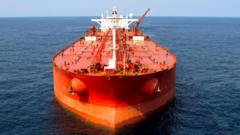Global oil prices have surged dramatically following Israel's recent military strikes on Iran, marking a significant rise in tension in the Middle East. The benchmark Brent crude price jumped over 10% shortly after the announcement, reaching its highest point since January. Traders are expressing concerns that an escalation in conflict between the two nations could potentially disrupt oil supplies originating from this energy-rich region.
After an initial spike, oil prices moderated slightly but still maintained an increase of over 5% from the previous day's closing, trading at approximately $74.47 a barrel. Despite this rise, current prices are still more than 10% below levels observed a year earlier and are far from the peaks witnessed in early 2022, which saw crude prices exceed $100 a barrel due to the impact of Russia's invasion of Ukraine.
Financial markets reacted to the news with a downturn; share prices fell in Asia and Europe, with Japan's Nikkei index down by 0.9%, and the UK's FTSE 100 declining 0.3% during lunchtime. Similarly, US stock markets opened lower, with the Dow Jones Industrial Average dropping 1.5% and the S&P 500 decreasing by 0.8%. This volatility prompted a flight to safety among investors, leading to gains in "safe haven" assets such as gold, which reached its highest price in nearly two months at $3,423.30 per ounce.
According to Israeli Defense Forces (IDF), Iran responded to the strikes by launching approximately 100 drones towards Israel. Industry experts suggest that energy traders are closely monitoring the situation, as escalation could have significant implications for oil prices. Vandana Hari of Vanda Insights highlighted the potential for the situation to either de-escalate quickly or to spiral into a broader conflict that would disrupt oil supplies.
Capital Economics analysts warned that targeting Iran's oil production infrastructure could elevate Brent prices to a range of $80-100 per barrel. However, they noted that such a price surge could prompt other oil producers to ramp up output, effectively capping long-term price increases tied to inflation.
Rod Dennis from the UK's RAC warned that it is premature to gauge the impact of rising oil prices on retail petrol rates, emphasizing that two key variables are whether the wholesale prices stabilize and the pricing strategies of retailers.
In an extreme scenario, disruptions to oil shipping or infrastructure by Iran could significantly impact global oil flows through the Strait of Hormuz, a vital transit route responsible for approximately 20% of the world’s oil. The region is currently witnessing several tankers navigating to and from the strait, heightening the stakes for major oil and gas exporters and their clients.
Market reactions remain volatile, with analysts indicating that the immediate response could shift as developments unfold in the coming days. Investors are advised to remain vigilant in tracking the implications of this evolving situation for future global oil prices.






















